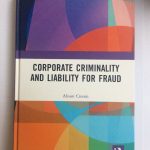We report here on a successful programme of research, involving engagement with public policy, aimed at reducing the scourge of economic crime. If accepted the proposals made would have a substantial impact on frauds involving major companies, especially those in the financial services sector.
Economic crime takes many forms: from traditional manifestations of fraud, bribery, money-laundering and tax evasion to modern slavery and human-trafficking offences providing forced labour. Striking at the heart of global security, funding terrorism and political espionage, it also inflicts direct costs to businesses and economies, nationally and world-wide. Fraud alone is calculated to have cost the UK economy c. £190 billion (2017) while global estimates reveal a loss of £2.75 trillion (2013).
Focusing on corporate criminality, in March 2017, we responded to the Ministry of Justice Call for Evidence on Corporate Liability for Economic Crime. We argued that the current preference for corporate liability premised on the company’s failure to prevent criminal misconduct, as exemplified in the Bribery Act 2010, has little application in the context of widespread frauds emanating from “criminogenic” corporate cultures. Central to our proposals were a unique approach to attributing corporate dishonesty, through the adoption of a Criminal Practice Direction, and a shift of resources from regulation and compliance to investigation and prosecution of serious fraud.
In March and April 2018, we went on to publish our full results in a series of two articles in the Company Lawyer: New models of corporate criminality: the development and relative effectiveness of “failure to prevent” offences; and New models of corporate criminality: the problem of corporate fraud – prevention or cure? The General Editor of The Company Lawyer is Professor Barry Rider, Cambridge University, who was honoured in 2014 with the award of an OBE for services to the prevention of economic crime.
The research for these articles was wide-ranging with many questions that needed to be asked, from the definition of fraud itself and the scale of economic crime to the relative effectiveness of models that could be employed to tackle corporate fraud. Traditional “black letter” law research was useful for some aspects, for example, the analysis of the Bribery Act 2010 and its extension in the Criminal Finances Act 2017 in relation to offshore tax evasion. Other questions required substantial historical research, such as the law’s response to the particular problem of bribery and the precedents for the successful use of a “failure to prevent” model of criminality. The impact of reforms and potential reforms required a detailed analysis of recent prosecutions and the use of deferred prosecution agreements.
On Sunday 18th March 2018, the Independent reported Solicitor-General Robert Buckland MP as saying there is a “strong case” for a new corporate economic crime offence. We anticipate that our timely research will prove valuable in shaping the debate as to what the law should be and how it can be made to work.
Dr Stephen F Copp, Associate Professor, Law Department
Dr Alison Cronin, Senior Lecturer, Law Department
 Dr Alison Cronin’s book on economic crime published
Dr Alison Cronin’s book on economic crime published Dr Alison Cronin submits evidence to Treasury Committee on Economic Crime
Dr Alison Cronin submits evidence to Treasury Committee on Economic Crime Fusion Investment Fund: International approaches to the investigation of juvenile crime – a comparative analysis to inform UK policy.
Fusion Investment Fund: International approaches to the investigation of juvenile crime – a comparative analysis to inform UK policy.










 From Sustainable Research to Sustainable Research Lives: Reflections from the SPROUT Network Event
From Sustainable Research to Sustainable Research Lives: Reflections from the SPROUT Network Event REF Code of Practice consultation is open!
REF Code of Practice consultation is open! BU Leads AI-Driven Work Package in EU Horizon SUSHEAS Project
BU Leads AI-Driven Work Package in EU Horizon SUSHEAS Project ECR Funding Open Call: Research Culture & Community Grant – Apply now
ECR Funding Open Call: Research Culture & Community Grant – Apply now ECR Funding Open Call: Research Culture & Community Grant – Application Deadline Friday 12 December
ECR Funding Open Call: Research Culture & Community Grant – Application Deadline Friday 12 December MSCA Postdoctoral Fellowships 2025 Call
MSCA Postdoctoral Fellowships 2025 Call ERC Advanced Grant 2025 Webinar
ERC Advanced Grant 2025 Webinar Update on UKRO services
Update on UKRO services European research project exploring use of ‘virtual twins’ to better manage metabolic associated fatty liver disease
European research project exploring use of ‘virtual twins’ to better manage metabolic associated fatty liver disease